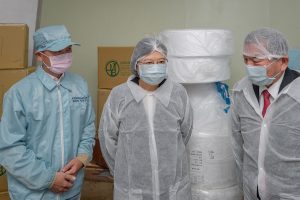The novel coronavirus outbreak that began in Wuhan couldn’t have come at a worse time for China’s Xi Jinping: 2020, the year in which the Chinese Communist Party (CCP) has pledged to redeem the centennial goal of achieving a “moderately prosperous society.” Yet, as businesses struggle and crooked government institutions get exposed, China’s social stability and economy are taking a hard hit. The World Health Organization has declared the disease a “Public Health Emergency of International Concern,” and coordinated international response to the public health crisis is now more critical than ever.
Meanwhile, Taiwan’s President Tsai-Ing Wen has depicted the island as the “forefront of global epidemic prevention.” While epidemics have frequented Taiwan, it is restricted from joining the WHO due to China’s claims over the island. As the staggering death tolls and economic damage continue to increase in China, public health may incentivize the two sides to break the current impasse.
For China, the pan-green Democratic Progressive Party’s re-election in January has instilled fear of Taiwan trending toward independence. China’s State Council Taiwan Affairs Office said that any attempt to use the novel coronavirus to plot “Taiwan independence” is doomed to fail. Despite the political risks, China would have much to gain by dropping its incorrigibly obstinate political principles and permitting Taiwan’s accession in the WHO.
Given the number of Taiwanese visitors (over 700,000 in 2019) and China’s current “31 measures” to encourage Taiwanese to settle in China, Taiwan’s public health condition has grown increasingly consequential to China. Taiwan’s access to global public health cooperation should thus help prevent future pandemics in the region. As the new coronavirus continues to rampage within China, hardliners in Beijing should be more accepting of extending an olive branch to Taiwan to prevent future pandemics from crippling China’s already slowing economy and social stability – the foundations of the Chinese government’s legitimacy.
China’s lack of leniency has fueled public anger in Taiwan, which will provide pro-independence factions with political assets to utilize. Disgruntled Taiwanese have slammed Taiwanese celebrities supportive of donating or exporting Taiwan’s medical face masks to China. China could use this opportunity to quell Taiwan’s public outcry and leave the pro-China Nationalist Party or Kuomintang some space to rebrand itself after a devastating election defeat.
Leaders and government spokesperson from Canada, Japan, and the EU have called for Taiwan’s inclusion in the World Health Assembly as an observer, something Beijing previously allowed under the Ma Ying-jeou administration in Taiwan. Japan’s Prime Minister Shinzo Abe has argued that “under the premise of epidemic prevention and public health policies, ‘political stances’ should be overruled.” The international society has increasingly voiced their support for Taiwan’s accession in the WHO, and Taiwan’s recent active appeals to join the global health body may suggest that increased international pressure is expected to increase its chances. On the contrary, China has shown increasing reluctance in the face of global pressure, as it would open the precedent of Taiwan achieving its “independence agenda” by aligning with “foreign forces.” It would also show Xi Jinping as bowing to pressure.
For Tsai, showing goodwill with incentives for China to readily respond to — rather than exploiting the China threat narrative for political gains — would demonstrate that she’s sincere. One way Tsai could extend the olive branch is by endorsing Xi’s concept of “a Community of Shared Future for Mankind” in its appeal to join the WHO. The concept advocates the idea that “A country cannot have security while others are in turmoil, as threats facing other countries may haunt itself also.” Acknowledging Xi’s vision would contribute to his prestige and a sense that cross-strait relations are guided by his narrative. Tsai might tactically concede by referring to Taiwan as “the Republic of China” with respect to the spirit of “the 1992 consensus.” Such remarks would fall short of yielding Taiwan’s sovereignty but increase the acceptability of the offer to Beijing as it would be a considerable improvement from Tsai’s recent “We are an independent country” declaration. The discontent of pan-green supporters would be offset by the entry permit to the WHO.
Xi could, in turn, endorse the move as part of his “New Asian Security Concept” that looks to “establish a new regional security cooperation architecture, and jointly build a road for security of Asia that is shared by and win-win to all.” The political element of granting Taiwan observer status would be neutralized by a marked emphasis on the concern for substantive public health security, thence removing the idea that China is giving the green light to supporting Taiwan’s independence. Xi has remarked previously that “We Chinese should not fight each other…Chinese should help each other.” A warm response to Taiwan’s appeal would establish a positive image of Xi among the public and neutralize the hawks in Taiwan. It would also project the image that China values human rights over political interests, without appearing to cave into international pressure. Xi’s reputation would increase domestically, across the strait, and internationally.
The engagement would be most viable at the current time, when public health concerns would trump the political backlash. After all, China’s economy could be worse when the next epidemic hits, and the leadership should make sure the next disease doesn’t come from Taiwan. As China has responded to Taiwan’s request to evacuate the Taiwanese trapped in Wuhan, it shows cooperation is still possible, albeit limited.

































